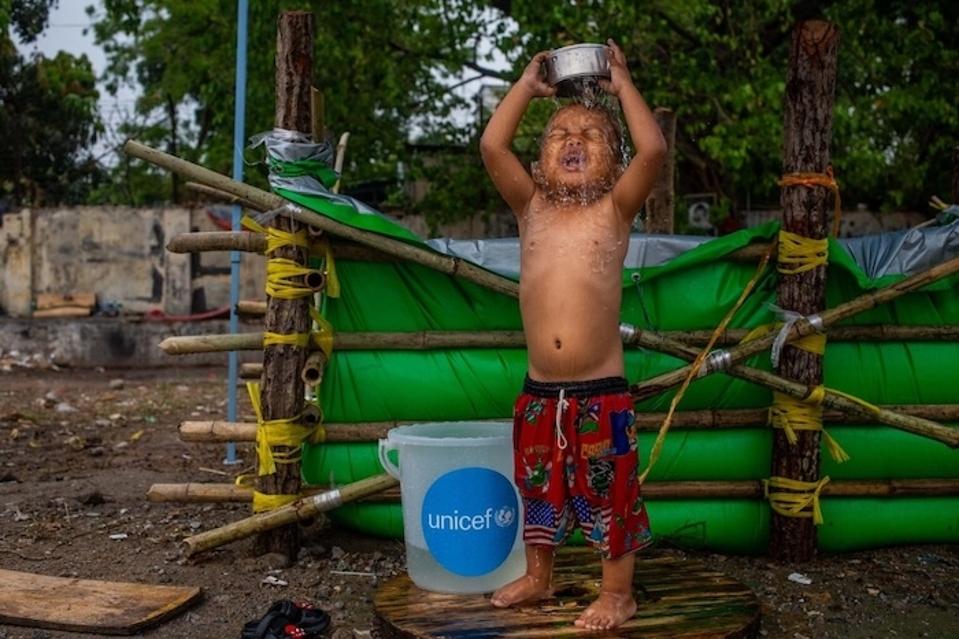Damage from the earthquake and extreme heat are compounding existing vulnerabilities for families in central Myanmar. More than 9 million people, including 2.7 million children, are estimated to be in the worst affected areas.
In the 10 days after a magnitude 7.7 earthquake hit central Myanmar on March 28, 2025, 109 aftershocks were recorded, ranging from 2.8 to 7.5. Afraid their houses may collapse at any moment, families are sleeping out in the open along roadsides near their homes.
Medical student May Min Thone was preparing lunch for her family when the first earthquake hit. “The walls started shaking and everything was falling off from the shelves,” she says. “I was so panicked, I lost my mind for some seconds because it was so sudden. I snapped out of it only when my father shouted, Run!”
As the wall she was holding onto started to crack, Thune dashed for the door. “It was really a nightmare for me,” she continued. “When I went out of the house, there were people running out from their houses into the streets, screaming, crying and calling out for help. Luckily, my family survived and my house didn’t collapse, which was a relief for my family. But still, I see a lot of buildings collapsing.”
In the video below, Thune, a 21-year-old UNICEF U-reporter, describes the situation on the ground in Mandalay.
Video: A firsthand look at life in a disaster zone
UNICEF and partners are supporting urgent water, sanitation and hygiene (WASH) needs
April is typically Myanmar’s hottest month; temperatures are reaching past 100 degrees Fahrenheit. Mosquitoes are a constant threat, especially for families sleeping outside without mosquito nets or shelter from heavy rains, raising fears of dengue fever and malaria outbreaks. Access to safe water and proper sanitation is urgently needed to prevent the spread of cholera, acute watery diarrhea and other waterborne diseases.
UNICEF is rushing urgently needed supplies to children and families devastated by the earthquake. As of April 8, UNICEF and partners have delivered water purification chemicals to meet the needs of over 305,000 people for the next 30 days. More than 58,00 gallons of domestic water have been delivered to meet the needs of 27,485 people in the affected areas.
Drinking water is being delivered daily to 2,500 people. Sanitation services are being provided to over 1,000 people in Mandalay. Through partners, 150 twin latrine units and handwashing facilities will be installed in Mandalay town to further improve sanitation services.
UNICEF is distributing essential health and nutrition supplies
Almost 200 health care facilities across central Myanmar have sustained damage; remaining health centers are overwhelmed and reporting critical shortages of medical supplies.
With more than 10 partners operating in earthquake-affected areas, UNICEF is providing essential health and nutrition services through mobile clinics and temporary emergency health facilities. Through the distribution of emergency health kits and other essential supplies, UNICEF is supporting over 250,000 people in the affected areas of Sagaing, Mandalay and Southern Shan for a period of three months.
UNICEF is also deploying trauma care equipment, personal protective equipment and kits for managing acute watery diarrhea, along with medicine and equipment for newborn care, all crucial for the support of around 100,000 people. Additional supplies are being dispatched to ensure pregnant mothers and children under 5 receive necessary screening and treatment, including for severe malnutrition.
Locating missing children and reuniting them with their parents remains a top priority, says Marcoluigi Corsi, UNICEF Representative to Myanmar, in the video below. “In such a situation, the most important thing is their protection. and living in a safe environment which only the family can provide.”
Video: A focus on child protection
Right now, the lives of the most vulnerable children hang in the balance as conflicts and crises jeopardize the care and protection that they deserve. Dependable, uninterrupted and effective foreign aid is critical to the well-being of millions of children. Please contact your members of Congress and urge them to support ongoing U.S. investments in foreign assistance.
Your contribution to UNICEF is more important than ever. Please donate.

